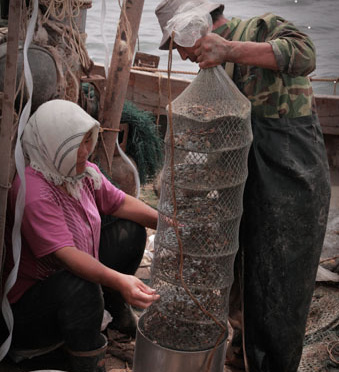Fishermen to sue oil company over spill pollution
 0 Comment(s)
0 Comment(s) Print
Print E-mail
Xinhua, August 18, 2011
E-mail
Xinhua, August 18, 2011
Fishermen in north China's Hebei Province are preparing to sue a U.S.-based oil company, as they believe recent oil spills in a nearby bay are to blame for large numbers of scallops dying.
 |
|
More than half of the scallops the fishermen raised have died and lead to large economic losses. |
Fishermen from the province's city of Tangshan said they believe that the scallops they were raising along the shores were poisoned by contamination from oil spills in the Penglai 19-3 oilfield located in the Bohai Bay.
The oilfield is jointly operated by a Chinese subsidiary of U.S.-based oil company ConocoPhillips and its partner, the China National Offshore Oil Corp (CNOOC).
The North Sea branch of the State Oceanic Administration (SOA) announced on Aug. 3 that the bay had been contaminated with fuel oil.
Economic losses of the fishermen are believed to be between 150 and 170 million yuan (about 23.5 to 26.6 million U.S. dollars), as more than half of the scallops the fishermen raised have died, according to Yang Jizhen, president of the Laoting County Fishery Association.
"Each family (of fishermen) has been affected to a different extent. A more accurate figure will be calculated by November," Yang said.
Local authorities have not offered an explanation for the loss of the scallops, leading the fisherman to hire lawyers to sue ConocoPhillips, Yang said.
Three million yuan (about 469,300 U.S. dollars) has been raised by the 153 families of fishermen who are planning to sue the company, according to Yang. The money will be used to cover their legal fees.
The SOA's monitoring center reported that water quality at four monitoring stations located near the scallop breeding areas was acceptable. However, the fishermen say that they can still see black oil washing up on the beach.
"Two strong tides, heavy rains and sunlight reduced some of the pollution. We just think the monitoring center did not test the water at the right time or the right place," local fisherman Zhang Yutian said.
Other fishermen said that they did see several workers cleaning up some of the oil in late July, but the fishermen did not know who the workers were or what their purpose was.
"We planned to make a fortune this year, as our scallops sold very well last year and we thought that Japan would import a lot of scallops due to its nuclear crisis. Some local villagers even borrowed money to invest in scallops," Zhang said.
"Our scallops might just be the best in all of China. We used to export to the United States, Japan and the Republic of Korea. Our dealers used to find us at this time every year, but this year, no one even looked for us," he said.
The fishermen said they suffered similar losses after an undersea oil pipeline was breached in 2006. The incident prevented local aquatic farmers from resuming normal production for over two years.
The SOA also posted a notice on its website on Monday saying that oil spills originating from oil platforms belonging to ConocoPhillips China, have contaminated China's marine ecosystem in north China's Bohai Bay.
The North China Sea branch of the SOA intends to take legal action against the company according to relevant regulations and laws, the notice said.
Agencies that wish to handle the case should submit applications to the branch by Saturday. A panel of domestic jurists and marine experts will be organized to conduct a preliminary examination of the applications by then.
About five qualified agencies will be selected as potential representatives. A legal service team, including a main acting agent and three to four assisting agents, will be established to handle the case after the evaluation process is completed.
More than 10 legal advisory agencies have shown interest in handling the suit over environmental damage caused by oil spills so far, according to the branch Thursday.






Go to Forum >>0 Comment(s)